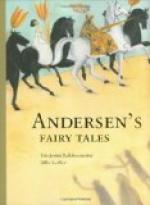“The rose in the valley is blooming so
sweet,
And angels descend there the children to greet.”
And the children held each other by the hand, kissed the roses, looked up at the clear sunshine, and spoke as though they really saw angels there. What lovely summer-days those were! How delightful to be out in the air, near the fresh rose-bushes, that seem as if they would never finish blossoming!
Kay and Gerda looked at the picture-book full of beasts and of birds; and it was then—the clock in the church-tower was just striking five—that Kay said, “Oh! I feel such a sharp pain in my heart; and now something has got into my eye!”
The little girl put her arms around his neck. He winked his eyes; now there was nothing to be seen.
“I think it is out now,” said he; but it was not. It was just one of those pieces of glass from the magic mirror that had got into his eye; and poor Kay had got another piece right in his heart. It will soon become like ice. It did not hurt any longer, but there it was.
“What are you crying for?” asked he. “You look so ugly! There’s nothing the matter with me. Ah,” said he at once, “that rose is cankered! And look, this one is quite crooked! After all, these roses are very ugly! They are just like the box they are planted in!” And then he gave the box a good kick with his foot, and pulled both the roses up.
“What are you doing?” cried the little girl; and as he perceived her fright, he pulled up another rose, got in at the window, and hastened off from dear little Gerda.
Afterwards, when she brought her picture-book, he asked, “What horrid beasts have you there?” And if his grandmother told them stories, he always interrupted her; besides, if he could manage it, he would get behind her, put on her spectacles, and imitate her way of speaking; he copied all her ways, and then everybody laughed at him. He was soon able to imitate the gait and manner of everyone in the street. Everything that was peculiar and displeasing in them—that Kay knew how to imitate: and at such times all the people said, “The boy is certainly very clever!” But it was the glass he had got in his eye; the glass that was sticking in his heart, which made him tease even little Gerda, whose whole soul was devoted to him.
His games now were quite different to what they had formerly been, they were so very knowing. One winter’s day, when the flakes of snow were flying about, he spread the skirts of his blue coat, and caught the snow as it fell.
“Look through this glass, Gerda,” said he. And every flake seemed larger, and appeared like a magnificent flower, or beautiful star; it was splendid to look at!
“Look, how clever!” said Kay. “That’s much more interesting than real flowers! They are as exact as possible; there is not a fault in them, if they did not melt!”
It was not long after this, that Kay came one day with large gloves on, and his little sledge at his back, and bawled right into Gerda’s ears, “I have permission to go out into the square where the others are playing”; and off he was in a moment.




